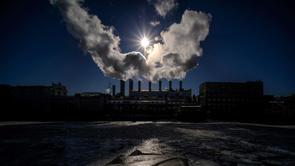 A thermoelectric power station works near the frozen Moskva river in central Moscow, Russia on March 11, 2021. (YURI KADOBNOV / AFP)
A thermoelectric power station works near the frozen Moskva river in central Moscow, Russia on March 11, 2021. (YURI KADOBNOV / AFP)
PARIS - Today's energy crisis is causing profound and long-lasting changes that have the potential to hasten the transition to a more sustainable and secure energy system, according to World Energy Outlook 2022 published by the International Energy Agency (IEA) on Thursday.
The biggest tremors of the energy crisis have been felt in the markets for natural gas, coal and electricity, with significant turmoil in oil markets as well. With unrelenting geopolitical and economic concerns, energy markets remain extremely vulnerable, according to the report.
The annual report of the Paris-based intergovernmental organization predicted that global CO2 emissions would fall slowly from a high point of 37 billion tonnes per year to 32 billion tonnes by 2050
The new measures taken by many governments in response to the crisis would help propel global clean energy investment to more than $2 trillion a year by 2030, a rise of more than 50 percent from today.
Total demand for fossil fuels would decline steadily from the mid-2020s to 2050 "by an annual average roughly equivalent to the lifetime output of a large oil field" and the share of fossil fuels in the global energy mix would fall from around 80 percent to just above 60 percent by 2050, according to the Outlook.
ALSO READ: IEA: Global gas markets to remain tight next year
The annual report of the Paris-based intergovernmental organization predicted that global CO2 emissions would fall slowly from a high point of 37 billion tonnes per year to 32 billion tonnes by 2050.
But with this achievement, "there is still a large gap between today's pledges and a stabilization of the rise in global temperatures around 1.5 degrees Celsius," it added
"Even with today's policy settings, the energy world is shifting dramatically before our eyes. Government responses around the world promise to make this a historic and definitive turning point towards a cleaner, more affordable and more secure energy system," said IEA Executive Director Fatih Birol.
READ MORE: IEA warns against energy crisis deepening fossil fuel reliance
Stronger policies will be essential to drive the huge increase in energy investment that is needed to reduce the risks of future price spikes and volatility, according to the outlook.
It suggested that above $4 trillion in clean energy investment would be needed by 2030 to deliver the Net Zero Emissions target by the 2050 Scenario.
And "major international efforts are still urgently required to narrow the worrying divide in clean energy investment levels between advanced economies and emerging and developing economies", it stressed.


